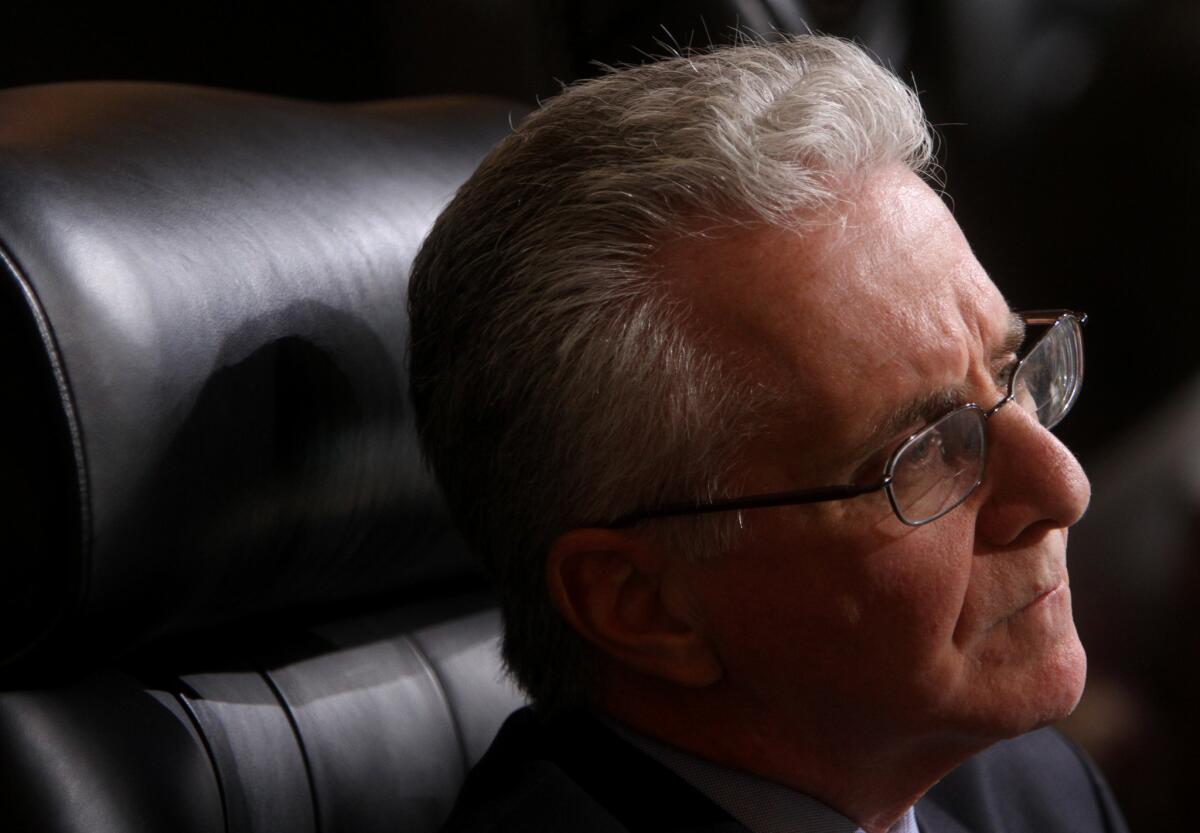L.A. councilman floating compromise plan on minimum wage hikes

Los Angeles City Councilman Paul Krekorian listens during a council meeting at City Hall on March 3, 2012.
A Los Angeles City Council member is floating a compromise plan on boosting the minimum wage, one that would increase hourly pay to $15.25 more gradually than other proposals being studied at City Hall.
Local lawmakers are expected to vote in coming weeks on a plan from Mayor Eric Garcetti to increase the minimum wage to $13.25 by 2017, up from the current state requirement of $9 per hour. A second proposal from council members would go further, taking the minimum wage to $15.25 by 2019.
But behind the scenes, Councilman Paul Krekorian has been laying out a more gradual timeline, something sought by many business owners critical of the existing plans. His proposal would also offer relief to small businesses and some nonprofit groups worried about how they would handle increased costs.
Krekorian said in a statement Friday that in the face of growing wage inequality, “we have an opportunity right now to lift many of our own hardworking residents out of poverty. We also need to ensure that our growing economy, led by small businesses, continues to expand and create new jobs.”
“My proposal strikes that balance,” Krekorian said.
Under his proposal, businesses with 51 or more employees would need to pay
a minimum wage of $13.50 starting in 2018, one year
later than Garcetti’s target for reaching $13.25. Those companies would need to pay at least $15.25 per hour
in 2021, a deadline two years later than the one floated by council members last fall.
The Krekorian proposal would also allow employers with up to 50 workers to pay a minimum of $13 per hour by 2019 and $15.25 per hour by 2022.
Stuart Waldman, president of the Valley Industry and Commerce Assn., called the Krekorian plan “a step in the right direction.” But Waldman said he still is worried that future increases in the required wage would be pegged to an inflation index.
Doing so is “a dangerous task that doesn’t give anyone flexibility during tough times, including the city,” Waldman said.
Ruben Gonzalez, senior vice president for public policy and political affairs at the Los Angeles Area Chamber of Commerce, said his group has concerns about the wage increase, but he called the Krekorian plan “a good start.”
Labor leaders and their allies criticized Krekorian’s approach. Gilda Valdez, chief of staff for Service Employees International Union Local 721, said in a statement that any proposal to delay a $15 minimum wage “ignores all the studies on economic benefits to our local communities, and is tone deaf to the increasing poverty threatening L.A.’s working families.”
As L.A. is increasingly recognized for its “coolness,” Valdez said, “let us be clear that the people preparing those freshly squeezed organic kale smoothies or cleaning up after you are done using the Wi-Fi at the trendy cafe need a $15 living wage.”
Councilman Curren Price said he hadn’t yet reviewed Krekorian’s proposal, but sees an urgent need for higher pay for “folks working two or three jobs.” Councilman Mike Bonin said he still wants the city to raise wages to at least $15
by 2019 and that the new
proposal “isn’t a compromise.”
“It effectively guts our proposal to give hardworking Angelenos a raise,” Bonin said in a statement. “Due to inflation and the increased costs of living every year, $15 delayed is $15 denied.”
But Councilman Joe Buscaino said the Krekorian plan is “a good compromise” and offered support for an even slower rollout of wage increases for companies with fewer than 100 workers. “This would address the concerns I’m hearing every day from the businesses in my district,” Buscaino said.
Under Krekorian’s plan, teenage workers would have to be paid only the state minimum wage or 85% of the city minimum wage — whichever is higher. Apprentices and people in transitional employment programs could also be paid at that lower rate. Nonprofits that rely solely on state and federal grants or reimbursements to pay their workers would be exempted entirely from the higher L.A. minimum wage.
Krekorian’s plan does not say whether there should be any adjustment in the wage rules for workers who get tips, but says City Atty. Mike Feuer should report back regarding “a path forward” on that issue.
Follow @latimesemily and @DavidZahniser for what’s happening at Los Angeles City Hall
More to Read
Sign up for Essential California
The most important California stories and recommendations in your inbox every morning.
You may occasionally receive promotional content from the Los Angeles Times.











